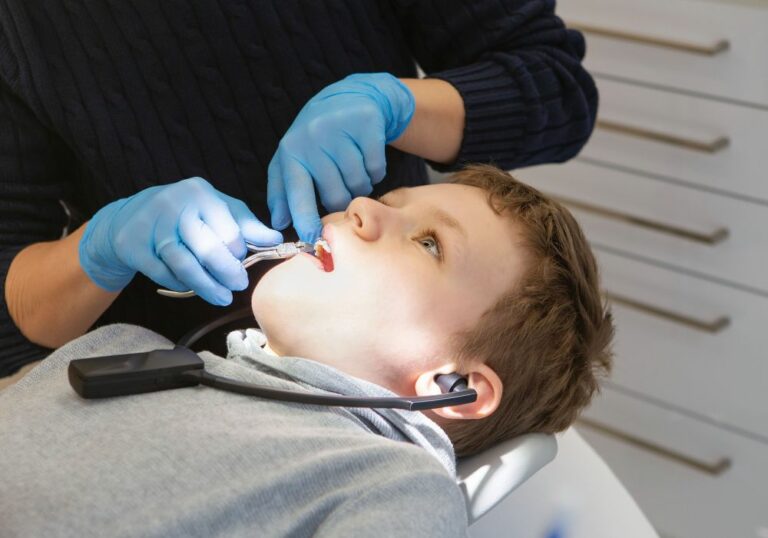Are you experiencing tooth pain and wondering how to get immediate relief? Toothaches can be incredibly uncomfortable and make it difficult to focus on anything else. Fortunately, there are several ways to alleviate the pain until you can see a dentist.
One of the most effective ways to get immediate relief from tooth pain is to rinse your mouth with warm salt water. This helps to reduce inflammation and kill bacteria that may be causing the pain. You can also try applying a cold compress to the outside of your cheek to numb the area and reduce swelling. Over-the-counter pain relievers like ibuprofen or acetaminophen can also be helpful in reducing pain and inflammation.
If your tooth pain is caused by a cavity or a broken tooth, it’s important to see a dentist as soon as possible. Ignoring the problem can lead to further damage and more severe pain. However, in the meantime, these remedies can provide temporary relief and make the experience more bearable. Remember to always consult with your dentist before trying any new remedies or medications.
Understanding Tooth Pain

Tooth pain can be incredibly uncomfortable and distracting, making it difficult to focus on anything else. Understanding the causes of tooth pain can help you take steps to prevent it and manage it when it does occur.
There are several common causes of tooth pain, including:
- Tooth decay: When bacteria in your mouth produce acids that eat away at your tooth enamel, it can cause cavities and tooth decay. This can lead to sensitivity and pain when eating or drinking hot or cold foods and beverages.
- Gum disease: Gum disease, also known as periodontal disease, is an infection of the tissues that surround and support your teeth. It can cause pain, swelling, and bleeding of the gums, as well as tooth sensitivity and pain.
- Tooth abscess: A tooth abscess is a pocket of pus that forms in the tooth or the surrounding tissues. It can cause severe pain, swelling, and fever.
- Tooth fracture or injury: A broken or injured tooth can cause pain and sensitivity, especially when eating or drinking.
- Bruxism: Bruxism is the habit of grinding or clenching your teeth, often during sleep. It can cause tooth sensitivity, pain, and even damage to your teeth.
If you are experiencing tooth pain, it is important to see a dentist as soon as possible to determine the cause and appropriate treatment. In the meantime, there are some things you can do to manage the pain and discomfort. These include:
- Rinsing your mouth with warm salt water
- Applying a cold compress to the affected area
- Taking over-the-counter pain relievers like acetaminophen or ibuprofen
- Avoiding hot or cold foods and beverages, as well as foods that are hard or sticky
- Using toothpaste for sensitive teeth
- Practicing good oral hygiene, including brushing and flossing regularly
By understanding the causes of tooth pain and taking steps to prevent and manage it, you can help keep your teeth and gums healthy and pain-free.
Immediate Remedies for Tooth Pain
If you are experiencing tooth pain, you likely want relief as soon as possible. Here are some immediate remedies that can help alleviate your discomfort:
Cold Compress
Applying a cold compress to the affected area can help numb the pain and reduce swelling. You can use a cold pack or wrap a bag of ice in a towel and hold it against your cheek for 15-20 minutes at a time. Be sure to take breaks in between applications to avoid damaging your skin.
Over-the-Counter Pain Relievers
Over-the-counter pain relievers such as acetaminophen or ibuprofen can help reduce pain and inflammation. Be sure to follow the recommended dosage on the label and consult with your doctor if you have any health conditions or are taking other medications.
Salt Water Rinse
A salt water rinse can help reduce inflammation and kill bacteria in your mouth, which can alleviate pain. To make a salt water rinse, dissolve 1/2 teaspoon of salt in a glass of warm water and swish it around in your mouth for 30 seconds before spitting it out.
Clove Oil
Clove oil contains eugenol, which has natural numbing properties that can help relieve tooth pain. To use clove oil, soak a cotton ball in a few drops of the oil and place it directly on the affected tooth. You can also mix a few drops of clove oil with a carrier oil, such as coconut oil, and apply it to the affected area.
Remember, these remedies are only temporary solutions and should not replace professional dental care. If your tooth pain persists or worsens, be sure to schedule an appointment with your dentist as soon as possible.
When to See a Dentist

If you’re experiencing tooth pain, it’s important to know when to seek professional care. While there are several home remedies and over-the-counter medications that can provide temporary relief, they may not address the underlying issue causing your pain. If you experience any of the following symptoms, it’s time to schedule an appointment with your dentist.
Persistent Pain
If your toothache lasts longer than a day or two, it’s time to see a dentist. This could be a sign of a more serious problem, such as an infection or decay that has reached the nerve of your tooth. Your dentist can evaluate your tooth and recommend the best course of treatment to relieve your pain and prevent further damage.
Swelling
Swelling around your tooth or jaw is a sign of infection, which requires immediate attention from a dentist. Ignoring this symptom could lead to serious complications, such as an abscess or the spread of infection to other parts of your body. Your dentist can prescribe antibiotics and drain any abscesses to prevent further complications.
Fever
If you have a fever along with your toothache, it’s a sign that your body is fighting an infection. This could be a dental infection or a more serious systemic infection. Your dentist can evaluate your symptoms and determine if you need antibiotics or if you should seek medical attention.
Trauma
If your toothache is the result of trauma, such as a fall or an accident, it’s important to see a dentist right away. Even if your tooth appears intact, there could be damage to the root or nerves that could lead to serious complications if left untreated. Your dentist can evaluate your tooth and recommend the best course of treatment to prevent further damage.
Remember, the longer you wait to seek treatment for your toothache, the more serious the problem can become. If you’re experiencing any of these symptoms, don’t hesitate to schedule an appointment with your dentist.
Preventing Future Tooth Pain

Tooth pain is a common problem that affects many people. While there are many ways to get immediate relief from tooth pain, it’s important to take steps to prevent future tooth pain. Here are some things you can do to prevent tooth pain:
Regular Dental Check-ups
Regular dental check-ups are an important part of maintaining good oral health. Your dentist can identify and treat dental problems before they become more serious. It’s recommended that you visit your dentist at least twice a year for a check-up and cleaning.
During your check-up, your dentist will examine your teeth and gums for any signs of decay, gum disease, or other dental problems. They may also take x-rays to check for any problems that may not be visible to the naked eye.
Proper Oral Hygiene
Proper oral hygiene is essential for preventing tooth pain and maintaining good oral health. Brush your teeth twice a day with a fluoride toothpaste and floss at least once a day. This will help remove plaque and bacteria from your teeth and gums.
In addition to brushing and flossing, you should also use mouthwash to kill bacteria and freshen your breath. Look for a mouthwash that contains fluoride to help strengthen your teeth.
Healthy Diet
Eating a healthy diet is important for maintaining good oral health. Avoid sugary and acidic foods and drinks, as these can erode your tooth enamel and lead to tooth decay. Instead, eat a diet rich in fruits, vegetables, and whole grains.
Drink plenty of water throughout the day to help wash away food particles and bacteria from your teeth and gums. Avoid sugary drinks like soda and sports drinks, as these can lead to tooth decay and other dental problems.
By following these tips, you can help prevent future tooth pain and maintain good oral health. Remember to visit your dentist regularly for check-ups and cleanings, and practice good oral hygiene at home.
Frequently Asked Questions
What are some home remedies for tooth pain?
There are several home remedies that you can try to relieve tooth pain. One of the most effective is a saltwater rinse, which can help to reduce inflammation and kill bacteria in the mouth. Another option is to apply a cold compress to the affected area, which can help to numb the pain. You can also try using clove oil or vanilla extract, both of which have natural numbing properties.
Is there a specific type of painkiller that works best for toothaches?
Over-the-counter painkillers such as ibuprofen or acetaminophen can be effective for relieving tooth pain. However, you should always follow the recommended dosage and consult with your doctor if you have any concerns about taking these medications. If your tooth pain is severe, your dentist may prescribe a stronger painkiller.
What can I do to relieve tooth pain at night?
To relieve tooth pain at night, try propping your head up with pillows to reduce blood flow to the affected area. You can also try using an over-the-counter oral numbing gel or a hot or cold compress. If your tooth pain is severe, you may need to see a dentist as soon as possible.
Can garlic really help with toothaches?
Garlic has natural antibacterial properties that can help to kill the bacteria that cause toothaches. To use garlic for tooth pain, crush a clove and mix it with a little bit of salt to create a paste. Apply the paste directly to the affected tooth for several minutes before rinsing with warm water.
How effective is hydrogen peroxide for tooth pain?
Hydrogen peroxide can be effective for reducing inflammation and killing bacteria in the mouth. However, it should be used with caution, as it can cause irritation or burning if not diluted properly. To use hydrogen peroxide for tooth pain, mix equal parts of hydrogen peroxide and water and swish the mixture around in your mouth for several minutes before spitting it out.
What are some common causes of tooth pain?
Tooth pain can be caused by a variety of factors, including tooth decay, gum disease, tooth abscesses, and tooth fractures. Other common causes of tooth pain include teeth grinding, sinus infections, and temporomandibular joint (TMJ) disorders. If you are experiencing tooth pain, it is important to see a dentist as soon as possible to determine the underlying cause and receive appropriate treatment.






